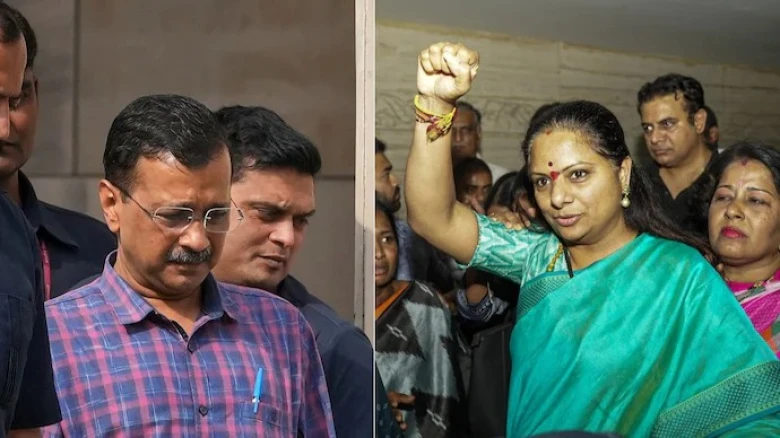North East

The arrests of Kejriwal and Kavitha are part of a broader crackdown on opposition figures, with other AAP leaders...
Digital Desk: Delhi Chief Minister Arvind Kejriwal and Telangana lawmaker K Kavitha, both prominent opposition figures, find themselves embroiled in controversy as they remain in extended judicial custody for their alleged involvement in the liquor policy scam. The recent developments have sparked controversies, particularly in the backdrop of the looming Lok Sabha elections.
Kejriwal, the head of the Aam Aadmi Party (AAP), and Kavitha, a leader of the Bharat Rashtra Samithi (BRS), were arrested last month in connection with the purported scam. Their continued detention, now extended for 14 days, raises questions about the timing and motivations behind these arrests, especially given the proximity to the national elections.
The accusations against Kejriwal include involvement in formulating the now-defunct policy and demanding hefty bribes, purportedly amounting to ₹100 crore, which were allegedly funneled into election campaigns in Punjab and Goa. Kejriwal has vehemently denied these allegations, attributing them to political vendetta orchestrated by the ruling Bharatiya Janata Party (BJP). Similar sentiments have been echoed by the AAP and other opposition parties, alleging targeted persecution by federal agencies under Prime Minister Narendra Modi's government.
The legal battle intensifies as Kejriwal challenges his arrest on money laundering charges, with pleas pending in both the Supreme Court and the Delhi High Court. Despite his ongoing legal efforts, the courts have thus far refrained from granting immediate relief, citing the need for further investigation by enforcement agencies.
In a concerning turn of events, Kejriwal's health has also come under scrutiny, exacerbated by his recent admission to receiving insulin after a spike in blood sugar levels. This development underscores the personal toll of the legal ordeal faced by opposition leaders, as Kejriwal battles not only legal charges but also health complications.
Meanwhile, Kavitha, daughter of former Telangana Chief Minister K Chandrasekhar Rao, finds herself entangled in a similar legal quagmire. Arrested by the Central Bureau of Investigation (CBI) on allegations of involvement in the liquor policy scam, Kavitha, like Kejriwal, vehemently denies the charges. The timing of her arrest, just weeks before the elections, raises suspicions of political motivations behind the legal actions.
The arrests of Kejriwal and Kavitha are part of a broader crackdown on opposition figures, with other AAP leaders, including former Deputy Chief Minister Manish Sisodia and Rajya Sabha MP Sanjay Singh, also facing charges in the same case. However, the Supreme Court's observation regarding the lack of evidence linking AAP leaders to the alleged bribery casts doubt on the legitimacy of these charges.
As the legal battle unfolds, the focus shifts not only to the fate of the accused leaders but also to the integrity of the judicial process and the impartiality of law enforcement agencies. The forthcoming court hearings and the eventual verdicts will undoubtedly have far-reaching implications, not just for the individuals involved but also for the broader political landscape of the country.
Amid electoral fervor and legal wrangling, the fundamental principles of justice, transparency, and democracy must remain paramount. The citizens of India deserve a fair and impartial judicial system that upholds the rule of law without succumbing to political pressures or partisan agendas. Only then can the true spirit of democracy thrive, ensuring accountability and fairness for all.
Leave A Comment